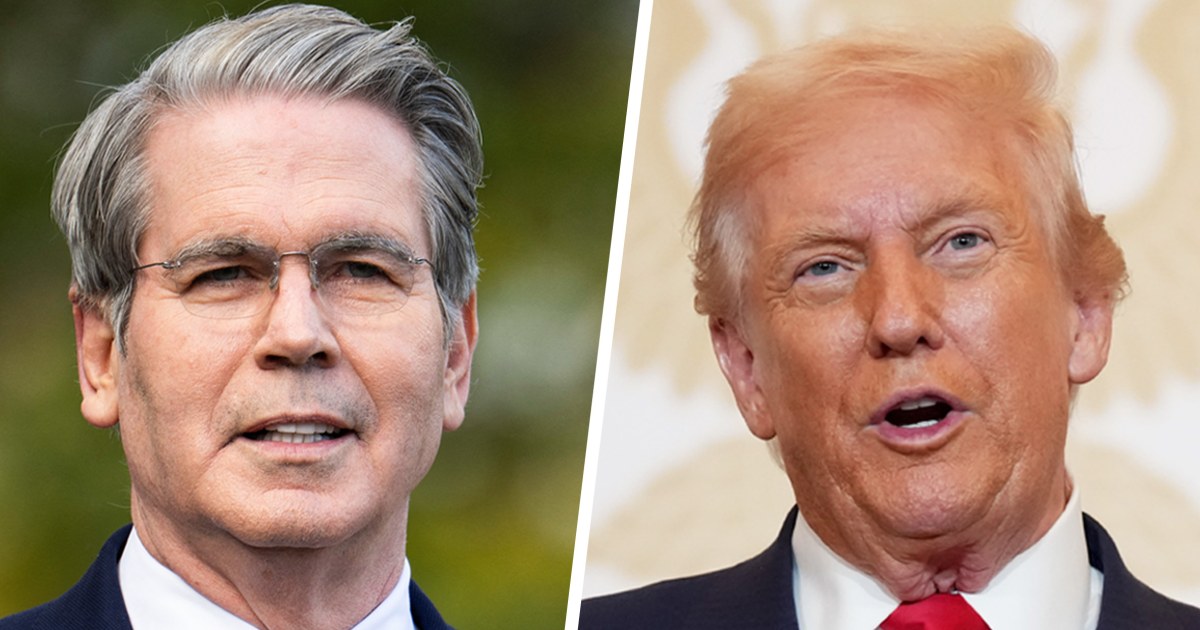Treasury Dept. says inflation is running ‘above target’ as Trump insists there is ‘no inflation’

The Treasury Department said Monday that inflation “remained above the target of 2 percent in the third quarter,” even as President Donald Trump and administration officials continue to assert that there is “no inflation.”
Speaking on CBS News’ “60 Minutes” on Sunday, Trump said, “We have no inflation, we have no inflation.”
Trump claimed that he had “already taken care of” inflation, calling 2% “the perfect inflation.”
But inflation came in at 3% on an annual basis in September, according to the Bureau of Labor Statistics.
“Food prices for both groceries (food at home) and food services (food away from home) increased moderately in the third quarter,” Treasury said in a new “Economy Statement.”
The statement released Monday is a regular economic update prepared for the Treasury’s Borrowing Advisory Committee.
The committee consists of nonpartisan bond market executives from firms such as Citigroup, Pimco, JPMorgan and BlackRock, and provides input to the Treasury on government debt and financing issues.
A White House spokesperson did not immediately reply to a request for comment on the Treasury statement.
One of the major drivers of food inflation was record beef prices, due in part to lower herd counts.
“We’re gonna get the beef price down very quickly. It’ll be very nice, just like eggs,” Trump said Sunday on CBS.
Overall, the Treasury Department said that “economic growth solidified in the third quarter with steady business investment and consumer demand.”
The third quarter is considered the three-month period from July 1 to Sept. 30.
CEOs of retail and food companies have noted that while consumer spending overall continues at a decent pace, lower-income consumers are faring much worse than middle and upper income Americans.
“Traffic for lower-income consumers is down double digits,” McDonald’s CEO Chris Kempczinski told CNBC in September. “We needed to step in.”
Coca-Cola’s chief operating officer, Henrique Braun, said the company also saw “divergency in spending between the income groups” last quarter.
Wages for the average worker only slightly outpace inflation. As of August, median pay increased at a 4.1% rate, compared with inflation, which is pacing at 3.0% on an annual basis.
Inflation has risen every month since April, when it was recorded at 2.3%.
On the topic of the labor market, which many economists and analysts view as rapidly weakening, the Treasury said it sees the market for job seekers as “relatively steady” although “monthly job growth moderated slightly, while the average unemployment rate ticked up only slightly.”
Employment growth “is below the roughly 100,000 jobs added per month in the first quarter of 2025,” Treasury said. This “likely reflects the drop in population growth related to the forced and self-deportation of illegal immigrants.”
It further added that, “although employment growth slowed in the second and third quarters of 2025, data do not indicate the slower growth is a result of soft GDP growth or weakening aggregate demand.”
GDP, the primary measure of the country’s economic output, rose 3.8% in the second quarter. Third-quarter GDP data was set to be released on Oct. 30, but has been delayed by the government shutdown.
There also have been no official jobs reports since September due to the shutdown. Private payroll processor ADP said on Oct. 1 that private companies had shed 32,000 jobs in September.
The delayed October jobs report could show another contraction.
“Excluding the shutdown, declining government employment may create a headwind for labor markets in the fourth quarter of 2025,” the Treasury said.
It noted that “the employment report for October could show a decline in total payroll employment” due to the departure of federal employees who opted for deferred resignations earlier this year.
Artificial intelligence could also play a role in the changing labor market dynamics.
“Artificial intelligence also could have disruptive impacts on the economy and labor markets as businesses and individuals integrate it or fail to,” the Treasury said. “Firms that are slow to adapt to the technology could find themselves at a competitive disadvantage.”
“Looking ahead to the next few quarters, the outlook for the U.S. economy faces upside and downside risks,” the report concluded. The Treasury said it would be “monitoring private-sector labor market developments closely” and said the administration would pursue “supply-side policies, deregulation, and other reforms” that it says will “protect the American consumer.”
Source link

